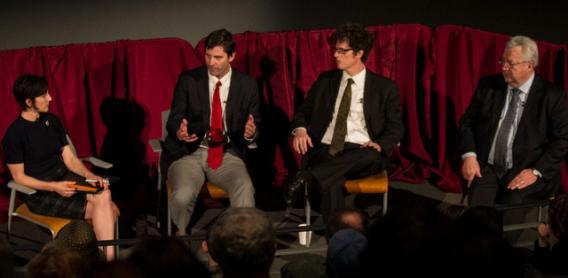The threat of climate change took center stage during President Obama’s inaugural address last week, as Will Oremus described in Future Tense. Yet many remain skeptical that Obama means business—including three prominent voices in the field of alternative energy.
Last Thursday, former Shell Oil President John Hofmeister; Mark Jacobson, director of the Stanford University‘s Atmosphere/Energy Program; and documentary filmmaker Peter Byck took part in a panel discussion at Arizona State University called “The Future of Energy: Brown, Clean, or In Between?” Among the topics they discussed: their shared doubts about Obama’s ongoing efforts to combat climate change. (Disclosure: Arizona State is a partner with Slate and the New America Foundation in Future Tense.) The panel was moderated by Eve Troeh, a sustainability reporter for American Public Media’s Marketplace.
Hofmeister, who founded the nonprofit Citizens for Affordable Energy and is currently a member of ASU’s School of Sustainability, dismissed Obama’s inaugural statement as “rhetorical” and declared that Obama lacks credibility in this debate. He called the president’s previous efforts in wind, solar, and biofuels “mediocre,” adding that they could easily be undone by future administrations. (In the past, Hofmeister has also criticized Obama for not pursuing off-shore drilling.)
The former Shell president also places blame in the hands of the American public. “The issue of climate and energy doesn’t poll well,” he said to the audience. “When we try to push science onto the uninformed, they’re skeptical,” whether it’s climate change, gun control, or health care. But with proper regulations, plus the use of natural gas as a “bridge fuel” while cleaner energy sources are developed, Hofmeister believes we can reach a “carbon-free energy system” in America by 2050.
Stanford’s Jacobson agreed that 2050 could be a reasonable goal. But the professor of civil engineering says Obama has done “nothing close to changing the infrastructure of the U.S.” Furthermore, he warned that natural gas could actually be a “bridge to nowhere.” According to Jacobson, the supposedly “cleaner” energy source is actually worse for global warming that coal. While they may emit relatively similar amounts of carbon dioxide and methane, coal offsets half of its warming by also emitting large amounts of sulfur dioxide, a natural coolant that reflects radiation and fosters cloud thickness. Natural gas, on the other hand, emits both high amount of methane and black carbon, making it one of the leading contributors to Arctic melting.
Much of this debate sounds familiar, of course. After the panel, Hofmeister told me, “Obama is in the same position as the last seven presidents who have promised energy independence. He’s not an expert. He has many other things on his plate.”
The most hopeful remarks came from Peter Byck, director and producer of the documentary Carbon Nation. Contrary to popular belief, says Byck, America is not actually divided when it comes to energy reform. The process of making and promoting Carbon Nation—which explores various ways to meet worldwide energy demands through non carbon-based sources—taught him that most Americans agree that the United States must shift to the use of clean energy. However, the general public is told that they bitterly disagree on topics like the carbon tax. “There’s a whole industry that needs America to be polarized, so they can sell books and have TV shows,” Byck said after the panel.
We need better national leadership to overcome this problem, Byck believes. One way Obama could make a difference here—and appeal to both his supporters and his skeptics—is to focus patriotism. “I think [Obama] is grossly underestimating the enthusiasm and appetite for America to lead on this issue, both within the country, and outside the country,” Byck said. “The world is waiting.”
